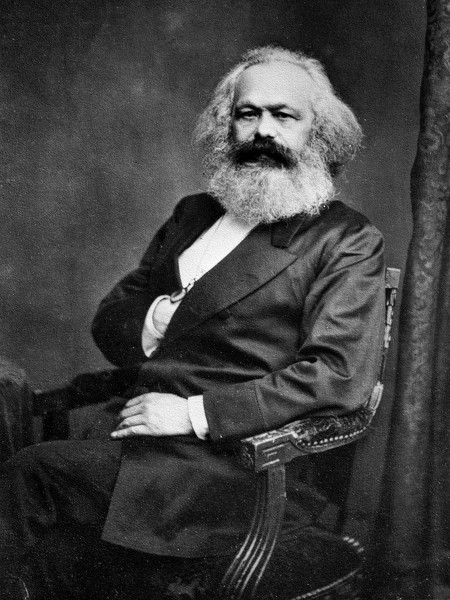Wednesday, September 8th, 2021
What connects Karl Marx with Ohio? A guy in St. Marys
Author links Union general to father of communism
By Erin Gardner

Submitted Photo
Karl Marx, the co-author of "The Communist Manifesto."
ST. MARYS - A German revolutionary who shot a follower of Karl Marx in a duel before coming to the United States and fighting with the Union Army in the Civil War ended up living his final days in St. Marys, where he founded what would become the town library.
David Dixon, a California-based historian and author, will promote his book, "Radical Warrior: August Willich's Journey from German Revolutionary to Union General" at St. Marys Community Public Library at 6 p.m. Monday.
"The book is a biography and I think what drew me to August Willich was (that) he had a very unusual life," Dixon said.
Willich, a German general, became a lieutenant in the Prussian Army. During his 17-year career in the army, there was discord among the working classes of Europe. Capitalism was gaining strength. The social landscape was changing from home-based work to factory work, according to Dixon.
"The more he became exposed to this because he was raised in a privileged environment, the more he saw the injustice in how the poor and working-class people were treated," Dixon said. "(The military officers) started (to) express republican views, which basically means popular rule versus the divine right of kings rule."
Because of differing opinions, the king of Prussia forced out Willich and several of his good friends, many of whom would end up in America. During that time, the revolutions of 1848 broke out all over Europe.
"You could think of it like the Arab Spring in our times but without social media. It's pretty amazing that all this pent-up desire for popular rule breaks out in all of these countries that are essentially monarchies," Dixon said.
The monarchies lost; Willich and his fellow German revolutionaries fought in three separate uprisings, but they had to flee the country after being sentenced to death for rebelling against their king. They wound up in England, which had a constitutional monarchy; it was the only place they could safely express their views, Dixon said.
Willich took up company with Marx and Friedrich Engels, authors of "The Communist Manifesto."
"Willich and Marx end up having very different ideas about what the future of socialism or communism ought to look like in Europe," Dixon said. "Willich's idea is basically that we need to keep pressing for (the) immediate violent overthrow of the princes and kings of Europe. Marx, on the other hand, has developed this strategy where he wants capitalism to play out. In other words, he feels like people have to go through capitalism and get to the end stage of capitalism before they're ready for something like socialism or communism."
Marx, who had a penchant for disparaging friends and enemies alike, called Willich an "uneducated four-times cuckolded jackass," Dixon said.
Insulted, Willich challenged Marx to a duel. Marx declined but one of his followers took Willich up on the challenge. The duel was held in Belgium, where the practice was legal. Willich shoot the follower in the head, but he survived.
Willich, disillusioned with the state of governance in Europe, then traveled to America.
"Because at least in America, you have a republican government, a popular government," Dixon said. "But in the meantime, they can also help America live up to its challenges of the Declaration of Independence because let's face it, America, despite, what (it claims) to be, is not really living up to their revolutionary promises. They're holding slaves."
Willich enthusiastically embraced the prospect of a civil war between the northern and southern states.
"When it appears that civil war is inevitable, (Willich) can't wait. He's like, 'Bring it on.' He's excited about it because he sees the plantation owners in the South to be almost the same as the royal aristocracy in Europe," Dixon said. "This is a privileged class and they're holding people in servitude, just like the European peasants are in serfdom in places like Russia, for example."
Willich eventually settled down in St. Marys and founded the Shakespeare Club, which became the St. Marys Community Public Library. He is buried in Elm Grove Cemetery.
He enlisted as a private in the Union Army. By the end of 1861, he had his own regiment and then by the spring of 1862, he was a brigadier general. When he died in 1878, the New York Times published his obituary, calling him the most accomplished and effective officer of German descent in the war, Dixon said.
"St. Marys is full of descendants of German immigrants," Dixon said. "That probably explains why he ends up in St. Marys at the end of his life because it was a small, little tight-knit, German community, as a lot of the communities are in that area, and I think he felt comfortable."
Willich was close to the children of the community. He never married and he didn't have any children, except for his soldiers who he called his "little children," Dixon said.
"He always kept a lot of candy in his pockets and he would take a ten-mile walk at breakfast every day and always stop and give out candy to the little children," Dixon said.
From St. Barbara, California, Dixon has written two books about Ohio figures.
"Ohio is just so full of history so it's just the happy hunting ground for people like me (who) want to research 19th-century American history," Dixon said. "I stumbled upon this guy and I was looking for a story which had not been told. That's really important to me. If I'm going to spend several years researching and writing a book, I'm going to write about somebody…(who is obscure and) maybe people haven't heard of, but they had an incredible, compelling life story and they were connected to a lot of important people and events."
Dixon started researching the book three years ago. He journeyed to Germany, France, Switzerland and of course, St. Marys. He visited the graveyard and researched in the library.
If Willich were alive today, he would likely be on the Bernie Sanders bandwagon, Dixon said.
"He would probably style himself like Bernie and (Alexandria Ocasio-Cortez) as a Democratic socialist," Dixon said. "Even though he was hanging out with Karl Marx for a couple of years, when he got to America, it became clear to him very early that…something like communism would never succeed in America. He remained committed to socialism his whole life. His No. 1 goal was to help working people get a fair shake (and) help them get good wages, good benefits. Eventually, his dream was to get rid of Congress and have an elected group of workers, and the workers would run essentially the government."
Dixon's book was published by University of Tennessee Press, an academic publisher, and ended up being one of its top ten sellers, he said.
Dixon has two other biographies in the works, but they're not far along. One is about an Italian who came to America and the other is about a Georgia native who was very loyal to the Union, but cooperated with the Confederacy.
Dixon will speak about his book at 6 p.m. Monday at the library. Books will be available for $35. For more information, call 419-394-7471.

Submitted Photo
Radical Warrior: August Willich's Journey from German Revolutionary to Union General
By David Dixon
University of Tennessee, 2020 Hardcover

